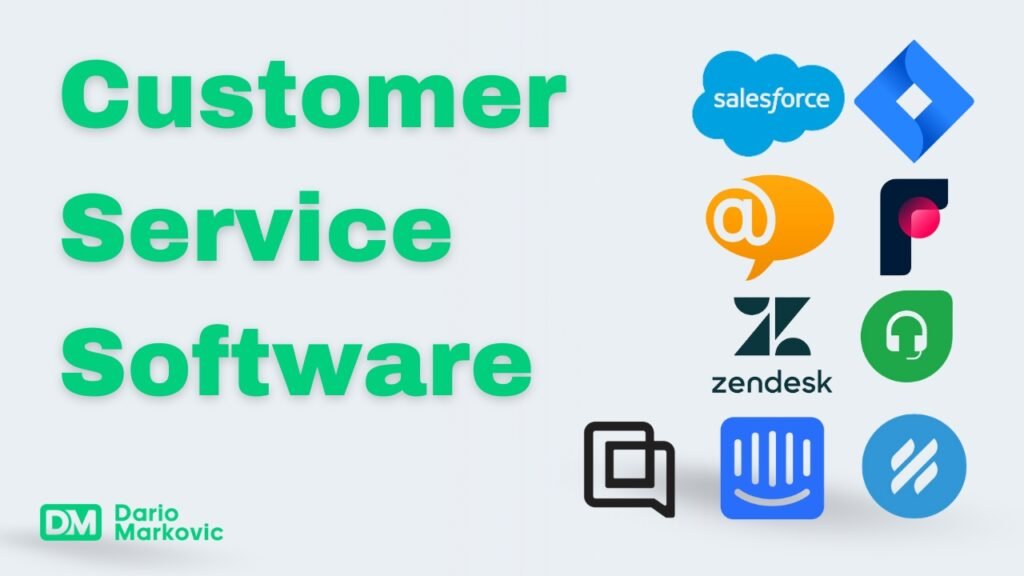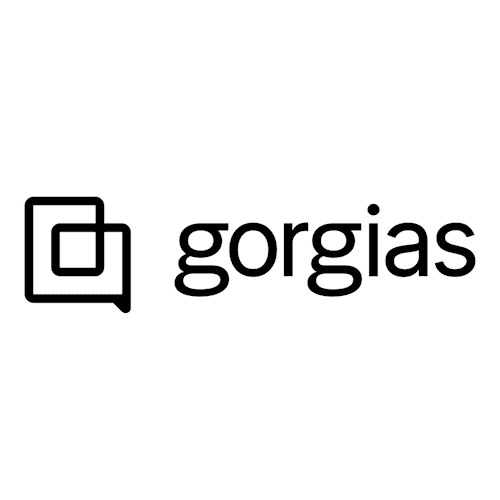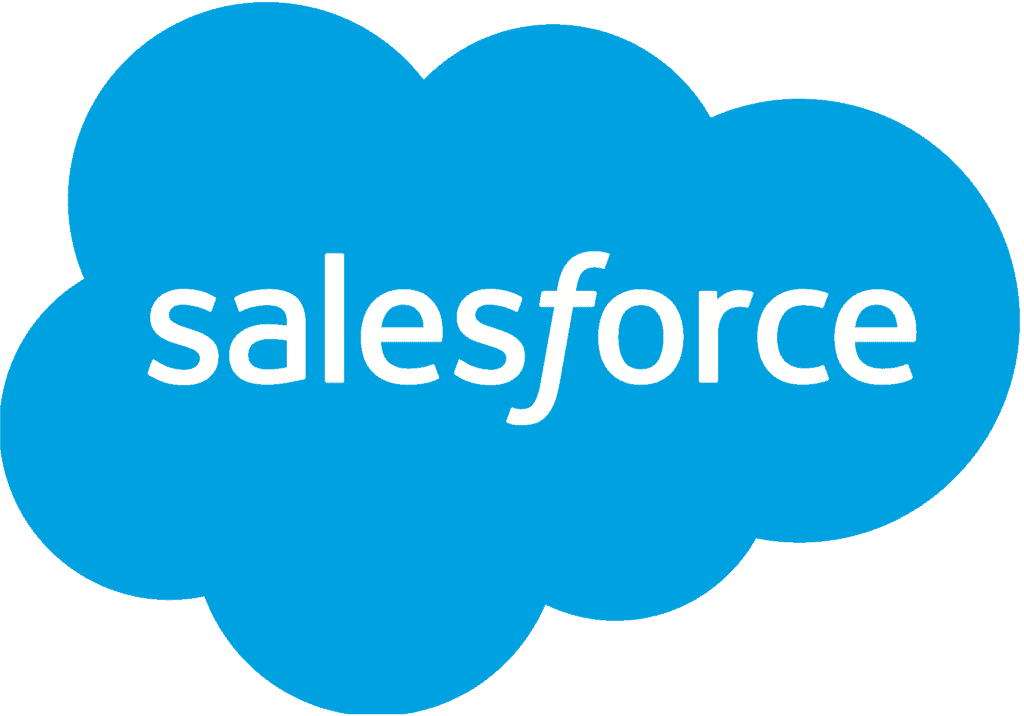Selecting the best customer service software requires matching your business needs with the right features and costs.
This article compares key contenders in 2025, outlining essential benefits and drawbacks to guide your choice without the fluff.
MY TOP PICKS
Forget the fluff—let’s dive into the real meat of what each contender brings to the table, weighing what good customer service is, the bad, and everything in between to help you make a decision that feels like a custom-made suit for your business.
Snapshot of Top 9 Customer Service Software Solutions
If you are in a hurry and want to know what software is best for something, check them out below.
- Best for All-Round Performance: Zendesk
- Best for Ecommerce: Gorgias
- Best for Messaging and Automation: Intercom
- Best for Budget-Conscious Businesses: Freshdesk
- Best for Multichannel Support: LiveAgent
- Best for Email-Centric Support: Help Scout
- Best for IT Teams: Jira Service Management
- Best for Service Process Automation: Salesforce Service Cloud
- Best for Email and Communication Management: Front
Zendesk
LiveAgent
Freshdesk
Intercom
Overall
4.2
4.3
4.0
4.1
User Ratings
4.0 (28 votes)
4.0 (27 votes)
4.0 (3 votes)
3.0 (6 votes)
Best For
Drop shipping, print on demand, small stores, boutiques, brick and mortar.
Private label B2C businesses, larger inventories.
Content driven brands, small to medium stores.
Print on demand, small stores, boutiques, brick and mortar.
Pricing
$29 - $299
$29 - $299
Free (Hosting Not Included)
$23 - $49
Pricing Based On
Features, User Accounts, Transaction Fees
Features & Sales
Hosting, Features, Extensions
Support, Storage & Features
Payment Gateways
100+
55+
100+
35+
Additional Transaction Fees
0 - 2%
None
None
0 - 3%
Value
4.0
4.0
4.5
5
Features
3.8
3.9
3.9
3.7
Performance
3.9
4.5
3.1
3.9
Features
4.9
4.8
3.3
4.2
Design & Themes
4.0
3.8
4.3
4.7
Integrations
4.6
4.2
4.1
3.5
What Are The 9 Best Customer Service Software?

Product
Pros/Cons
Ratings
- User-friendly interface for efficient multitasking
- Customizable options for automated workflows and help center design
- Reliable performance with quick response times and minimal downtime
- Advanced customizations can be complex
- Integration challenges reported by some users
Value
4.0
Features
3.8
Performance
3.9
Ease of Use
4.9
Design & Themes
4.0
Integrations
4.6
4.2
Overall Score
User Rating
4.7
28 reviews
-
The basic tier at $39
-
Advanced option at $99
-
Expert level at $139
I believe Zendesk excels as a flexible and dependable customer service software. The user-friendly interface offers efficient multitasking and easy navigation through the customer support ticket management system.
The platform’s customizable options allow users to automate workflows and design help centers, which can significantly enhance the customer support experience.
However, some users, including myself, have found advanced customizations somewhat complex and faced integration challenges. Despite these minor drawbacks, Zendesk‘s performance and reliability are commendable, with users experiencing quick response times and minimal downtime.
With a commitment to future enhancements aimed at improving AI, collaborative customer service tools, usability, and third-party integrations, Zendesk is an all-rounder in customer service software.
Product
Pros/Cons
Ratings
- Provides a shared inbox for streamlined customer support
- AI-powered chatbot for answering FAQs and providing self-service options
- Over 350 integrations in the marketplace
- Pricing can be a bit steep for small businesses
Value
4.0
Features
3.8
Performance
3.9
Ease of Use
4.9
Design & Themes
4.0
Integrations
4.6
4.2
Overall Score
User Rating
4.7
28 reviews
-
The basic tier at $39
-
Advanced option at $99
-
Expert level at $139
Intercom distinguishes itself as a customer support solution emphasizing messaging and automation. It provides a shared inbox that consolidates customer inquiries from various channels, making it easier to manage customer interactions.
One feature I particularly appreciate is Intercom’s chatbot, Fin, which offers conversational support by answering frequently asked questions or surfacing help center articles. This provides immediate responses to customers and reduces the workload for customer service agents.
Nevertheless, its pricing may be somewhat prohibitive for small businesses, particularly the advanced and expert plans.
Overall, Intercom is a solid choice for businesses that want to streamline their customer service processes with messaging and automation.
Product
Pros/Cons
Ratings
- Free Sprout plan and competitive paid plans
- A suite of basic to advanced features across different plans
- Some users report persistent bugs and service disruptions
Value
4.5
Features
4
Performance
4.1
Ease of Use
5
Design & Themes
4.3
Integrations
4.8
4.6
Overall Score
User Rating
4.8
28 reviews
-
The basic tier at $39
-
Advanced option at $99
-
Expert level at $139
Small businesses often prefer Freshdesk due to its cost-effective plans, which offer a spectrum of fundamental to advanced features that cater to diverse needs.
Its plan options include sophisticated capabilities like artificial intelligence responders, collision detection systems, and tools for managing field service operations.
Although several users have reported some concerns regarding ongoing bugs and interruptions in the service, Freshdesk continues to be a go-to solution for small enterprises because it delivers an affordable means to consolidate customer support strategies efficiently.
Product
Pros/Cons
Ratings
- Omnichannel universal inbox for streamlined customer support
- Real-time live chat and built-in call center capabilities
- Limited note/todo list sharing between agents
Value
4.0
Features
3.8
Performance
3.9
Ease of Use
5
Design & Themes
4.0
Integrations
4.6
4.2
Overall Score
User Rating
4.7
28 reviews
-
The basic tier at $39
-
Advanced option at $99
-
Expert level at $139
LiveAgent is a potent platform renowned for delivering multichannel support. It offers an omnichannel universal inbox, real-time live chat, and built-in call center capabilities, making it a powerhouse for managing customer interactions across different channels.
I particularly enjoy the platform’s gamified approach, which incentivizes task completion and increases efficiency and productivity.
However, some users have noted limited sharing of notes or to-do lists between agents, which could be improved for better collaboration.
Despite these minor drawbacks, LiveAgent remains a powerful solution for businesses seeking comprehensive multichannel support.
Product
Pros/Cons
Ratings
- User-friendly interface and clean design
- Specializes in email support with Docs Knowledge Base for customer self-service
- Limited customization options
Value
4.3
Features
4.1
Performance
4
Ease of Use
4.9
Design & Themes
4.3
Integrations
4.9
4.4
Overall Score
User Rating
4.8
28 reviews
-
The basic tier at $39
-
Advanced option at $99
-
Expert level at $139
Help Scout excels in email-based customer support, featuring an intuitive interface and polished aesthetics that promote a more individualized conversation. This streamlines introducing new users to the platform and improves the entire customer support experience.
A prominent attribute I consider extremely advantageous is its Docs Knowledge Base, which facilitates self-service for customers by allowing them to discover solutions independently.
Nevertheless, there have been remarks about the restricted customization possibilities within Help Scout. Despite this slight limitation, it is a superior option for companies aiming to advance their email-focused customer support services.
Product
Pros/Cons
Ratings
- Strong ticket management capabilities
- Seamless integration with other Atlassian products
- It can be complex and may have a learning curve for first-time users
Value
4.0
Features
3.8
Performance
3.9
Ease of Use
4.9
Design & Themes
4.0
Integrations
4.6
4.2
Overall Score
User Rating
4.7
28 reviews
-
The basic tier at $39
-
Advanced option at $99
-
Expert level at $139
Jira Service Management is a potent solution ideally tailored for IT teams. The platform offers strong ticket management capabilities and seamless integration with other Atlassian products, making it a go-to choice for teams using Jira for development.
One aspect I find particularly beneficial is the platform’s issue tracking and Agile project management tools, which enhance efficiency and productivity.
However, some users have found that Jira Service Management can be complex and may have a learning curve for first-time users. Despite this, Jira Service Management remains a top choice for IT teams looking to streamline their support processes.
Product
Pros/Cons
Ratings
- Provides agents with an omnichannel workspace
- Customizable workflows and automatic ticket routing
- It can be complex for businesses looking exclusively for a CX tool
Value
4.0
Features
3.8
Performance
3.9
Ease of Use
4.9
Design & Themes
4.0
Integrations
4.6
4.2
Overall Score
User Rating
4.7
28 reviews
-
The basic tier at $39
-
Advanced option at $99
-
Expert level at $139
Salesforce Service Cloud focuses on automating service processes and provides agents with a multi-channel workspace designed for effective customer support delivery. Among the notable capabilities of Salesforce Service Cloud are:
- Customizable workflows
- Automatic ticket routing
- Ticket management process streamlining
- Enhanced customer support experience
These functionalities are greatly valued since they enhance the customer support experience by harnessing customer feedback and efficiently handling customer support requests with the aid of our dedicated support team.
Companies aiming to elevate their service offerings might benefit more readily from platforms focusing on the customer experience, similar to how Salesforce provides a specialized suite for sales and marketing endeavors.
That being said, for organizations intent on automating their service workflows, Salesforce Service Cloud is an excellent option.
Product
Pros/Cons
Ratings
- Gorgias integrates with major e-commerce platforms like Shopify, Magento, and BigCommerce.
- Features like macros (pre-written responses) and tagging allow customer service representatives.
- Gorgias is heavily tailored for ecommerce businesses so it may be less beneficial for companies outside this sector.
- Gorgias' effectiveness relies on its integration with e-commerce platforms and other tools.
4.6
Features
4.5
Performance
3.9
Ease of Use
4.9
Design & Themes
4.0
Value for money
4.5
4.6
Overall Score
User Rating
4.7
111 reviews
-
Starter Plan $10 per month
-
Basic Plan $60 per month
-
Pro Plan $360 per month
-
Advanced Plan $900 per month
-
Enterprise Plan Custom pricing
Gorgias is often considered one of the best customer service software solutions, particularly for ecommerce businesses, due to its robust features, seamless integrations, and focus on automating and streamlining customer support processes.
Product
Pros/Cons
Ratings
- Consolidates customer inquiries across channels into a shared inbox
- Routes messages to the best-suited agent
- Custom Pricing
Value
4.0
Features
3.8
Performance
3.9
Ease of Use
4.9
Design & Themes
4.0
Integrations
4.6
4.2
Overall Score
User Rating
4.7
28 reviews
-
The basic tier at $39
-
Advanced option at $99
-
Expert level at $139
Front provides a suite of features designed to manage email and communication efficiently, including:
- Merges customer inquiries from various channels into a shared inbox and directs messages to the most appropriate agent
- Logs each interaction with the customer, allowing agents to access customer history for future support
- Includes built-in collaboration features for teams to communicate on customer support tickets tickets
These functionalities are advantageous because they simplify customer support and improve representatives’ productivity.
Nevertheless, there have been instances where users indicate that the platform’s cost structure may be somewhat burdensome for smaller enterprises.
Regardless, it happens. Front is consistently regarded as a robust option for companies aiming to upgrade their email and communications management.
How to Identify the Best Customer Service Software for Your Business
Selecting the exemplary customer service software for your company necessitates a tailored approach. It involves:
- Gaining an in-depth grasp of the specific requirements of your business
- Meticulously assessing essential functionalities and integration capabilities
- Considering how well the customer support software can accommodate future expansion.
In this segment, we will thoroughly examine each of these critical considerations.
Understanding Your Unique Business Requirements
Grasping your distinct business requirements is the initial move in selecting the appropriate customer service software. Recognizing your particular customer service standards and confirming that the chosen software aligns with your distinct business processes and objectives is critical. This could involve considering:
- The size of your customer base
- The complexity of your support processes
- The channels your customers prefer
- The level of customization you require

Evaluating Key Features and Integrations
Customer service management software, a customer service platform, has many features and integrations that can elevate your customer support experience. The best customer service software includes key features such as a customer service solution with a customer service team utilizing a customer service tool like:
- Shared inbox
- Automated workflows
- Customizable dashboards
- Integrations with third-party apps
These features can greatly enhance your ability to manage customer interactions, improve customer satisfaction, and effectively utilize customer data.
Assessing these features and integrations for alignment with your business needs and smooth integration into your current workflows is vital.
Considering Scalability and Future Growth
Another significant factor to consider when selecting customer service software is scalability. What does good customer service mean to you? As your business grows, so do your customer service needs. Choosing a scalable software solution that can grow with your business ensures operational efficiency and customer satisfaction over time.
This entails examining aspects like:
- The software’s capacity to manage a growing volume of customer interactions
- Its adaptability to evolving business processes
- Its pricing model is in line with your expected growth.
My Experience
In the current digital era, selecting the appropriate customer service software is essential for companies looking to provide superior customer support. The guide you’ve read furnished a detailed analysis of nine leading customer service software solutions as of 2025 and extensively covered critical considerations necessary when picking out the perfect fit for your enterprise.
It’s important to remember that the finest choice of service software should match your specific business requirements, encompass all necessary functionalities and integrations, and possess scalability to expand alongside your company.
Master your e-commerce strategies using our tools.
FAQ
Service software is a centralized hub for organizing customer interactions, enabling enterprises to enhance the overall customer experience by unifying multiple communication channels like email, chat, social media, and self-service features. It is instrumental in gathering data on customer support requests for analysis and reporting purposes.
Zendesk is a customer service solution hosted in the cloud which employs a software-as-a-service (SaaS) model. This is one of the customer service platforms that includes various features for support desks, email campaigns, real-time messaging, sales enhancement, and fostering customer engagement.
This comprehensive platform for managing customer interactions is designed to be intuitive and scalable with your company’s expansion.
Ensure that the service software you assess for customer support includes essential features such as a unified inbox, automation of workflows, tailor-made dashboards, and compatibility with external applications to enhance and refine your customer support operations.
Selecting scale-based customer service software is essential for maintaining operational efficiency and achieving sustained customer satisfaction as your business expands.
Considering scalability when choosing such software is vital to ensure long-term success in serving customers effectively.
A shared inbox in customer service software streamlines inquiries across channels, improving agent efficiency and enhancing customer service.














